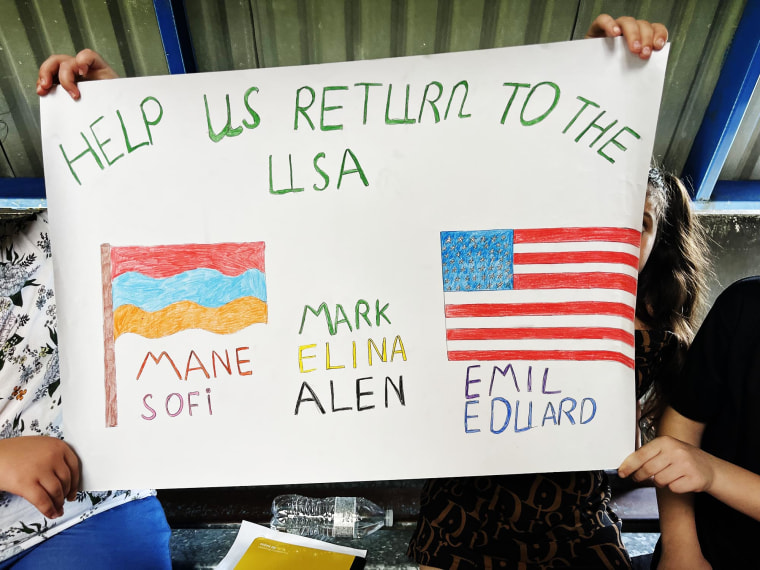Court orders Costa Rican government to release Asian migrants deported by Trump

The Costa Rica Constitutional Court ordered Rodrigo Chaves on Tuesday to release Asian migrants expelled by the Trump administration, which have been held in a temporary refuge in the country of Central America since February.
During a 4-3 vote, the judges noted that the Costarian government had violated the rights of migrants by not providing them with “appropriate and sufficient information” on their immigration status or giving them access to a legal advisor. “The free contact with the media was also not authorized, and there was no information from the start on the possibility of requesting asylum,” the court said in a statement.
The judges gave the government 15 days to release the expelled migrants and ordered him to determine their immigration status “individually” and on the basis of the law.
In February, the Trump administration sent 200 Asian migrants to Costa Rica on two expulsion flights, including nearly 100 children. The deportees came from countries like China, Afghanistan, India, Pakistan, Russia and Uzbekistan. More than 70 were minors.
The agreement between the two countries was concluded because the Costa Rica feared that President Donald Trump would ride if he refused to accept the migrants, according to the statements made to the President and the Minister of Foreign Affairs.
The deportees were immediately taken to the temporary migrant care center (Catem), in the canton of Corredores, 7 miles from the border with Panama. They slept cramped in shared berths and poorly ventilated in a hot and humid region where temperatures often exceed 90 degrees Fahrenheit.
On Tuesday, 28 people were expelled, including 13 minors, from Armenia, Russia, Azerbaijan, Afghanistan, Turkey and Iran, told Costa Rica to Noticias Telemundo.
The vast majority of deportees, 107, were repatriated to their countries of origin. 35 others left the center by themselves and 30 asked for asylum at Costa Rica, said Badilla.
The Costa Rican authorities described the decision of the Constitutional Court as a “serious error” and said that migrants there “enjoy total freedom; They can leave and move freely, ”said Badilla.

“(The constitutional decision) has no meaning. For months, these people have regular immigration status and total freedom of movement,” said the official.
“From our point of view, the Constitutional Court is mistaken and makes a serious mistake. He clearly does not understand the current situation of Catem,” he added.
The constitutional decision reacts to a petition by Habeas Corpus against the Costaorian government filed by the former Minister of Communications in the country, Mauricio Herrera.
At the end of April, Costa Rica granted humanitarian immigration status to migrants detained in the refuge after a group of human rights lawyers filed a complaint against the country before the United Nations Children’s Rights Committee, alleging that the Government had violated the rights of 81 migrant miners by holding them to the refuge without legal advice or access to education or psychological services.
At the time, Costa Rican authorities announced that migrants, whose passports were confiscated upon arrival in the country, would receive their documents and were free to leave the shelter and seek options to leave Costa Rica or ask for asylum if they wished.
In April, Noticias Telemundo visited Catem and spoke with some of the migrants, including a 36 -year -old Russian Smirnov, who was expelled with his 6 -year -old wife and son. Smirnov, from Saint Petersburg, said that he had worked in his country as an electoral official and witnessed elections in Russia. He said that he had searched for the organization of the opposition chief Alexei Navalny, who died in a Siberian prison in 2024, to report fraud during the 2024 elections, but the authorities under the Vladimir Putin regime discovered it.
“They will put me in prison or will send me to war” if he returns to Russia, said Smirnov. “It’s simple, because my country is at war with a neighboring country.”
Help the powerful northern brother
By announcing the agreement with the United States, Chaves said that Costa Rica helped his “economically powerful brother in the north” and said it feared punishment if it did not accept migrants.
“If they impose a tax on our free trade zones, they will kiss us,” said Chaves. “I do not think they will do it, thank God. … Love is reimbursed with love. … Two hundred we come, we treat them well and they leave,” he said at a press conference.
The Costaorian Minister of Foreign Affairs Arnoldo André Tinoco also expressed the fear of the country of Trump’s “pressure”, although he denied that she had materialized.
What Chavez meant, said André in an interview with Noticias Telemundo at the end of March, “was that, thanks to a goodwill gesture, we will reduce the pressure somewhat if the United States thought of imposing a kind of restriction that does not interest us. Of course, we are not interested.”
“There is no pressure. Possibility? Of course, it exists. Yes. Look at what the new American administration does. … You are not going to make me say that I was under pressure by the United States because it is not true,” he said.
An earlier version of this article was initially published in Noticias Telemundo.



